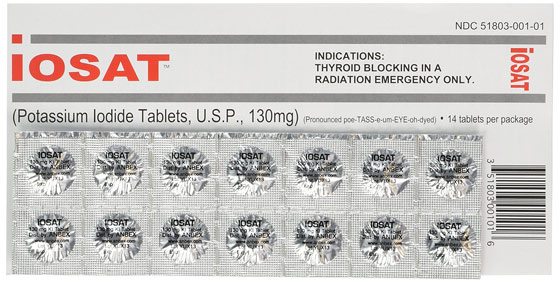Does Potassium Iodide Expire? Tablets Shelf Life – Answered
You might wonder, “Does potassium iodide expire?” (Potassium iodide tablets are used for an extent of nuclear radiation thyroid protection.)
In case you have been wondering if potassium iodide expires (such as the branded iOSAT™ tablets and others)… I found out that I had been wrong in my assumption. This was based on what I had heard from others, and the dates on packaging.
For those of you who don’t know what these tablets are… They’re basically ‘nuke pills’. They help prevent radioactive iodine from getting into the thyroid gland during a nuclear radiation emergency.
You do have some, right? (Good preparedness item to have, just in case.)
I always keep several packs of iOSAT™ (Potassium Iodide Tablets) on hand as part of my medical preps. Although I do not live near any nuclear power plants, it’s still cheap insurance to have on hand. There’s also that ongoing threat called nuclear war… But that would never happen, right?
>> Potassium Iodide Tablets, 130 mg (14 Tablets)
(view on amzn)
As with all types of ‘medications’, there is an expiration date printed on the package. I do know that generally in many or most cases these dates do not mean that the drug will ‘go bad’ the next day (for example).
In fact, far from it… Many drugs / medications will be quite effective for significantly longer, despite a slightly degraded efficacy.
With that said, we were going through our Medical / First Aid supplies and came across packets of iOSAT™ potassium iodide tablets. The “expiration” date indicated several years ago.
I decided to do some research on it, and guess what I found out? They are apparently still good!
Here’s what I discovered about their shelf life:
From the United States Nuclear Regulatory Commission, FAQ,
“Is it safe to take KI tablets with an expired shelf-life?”
(KI is potassium iodide)
Quote, “Yes, potassium iodide tablets are inherently stable and do not lose their effectiveness over time.”
“According to FDA guidance on Shelf-life Extension,
Studies over many years have confirmed that none of the components of KI tablets, including the active ingredient, has any significant potential for chemical degradation or interaction with other components or with components of the container closure system when stored according to labeled directions.”
“To date, the only observed changes during stability (shelf-life) testing have been the failure of some batches of KI tablets to meet dissolution specifications. Some tablets tested required slightly longer than the specified time to achieve dissolution. Even in the case of a failure of this sort, the product remains usable.”
So apparently and evidently, iOSAT™ tablets (or other potassium iodide tablets) do not expire in the context of suddenly “going bad”…
Source: U.S.NRC
What is Potassium Iodide?
Potassium iodide is a salt, similar to table salt. Its chemical symbol is KI. It is routinely added to table salt to make it “iodized.”
Potassium iodide, if taken in time and at the appropriate dosage, blocks the thyroid gland’s uptake of radioactive iodine and thus could reduce the risk of thyroid cancers and other diseases that might otherwise be caused by exposure to radioactive iodine that could be dispersed in a severe nuclear accident.
When potassium iodide is ingested, it is taken up by the thyroid gland. In the proper dosage, and taken at the appropriate time, it will effectively saturate the thyroid gland in such a way that inhaled or ingested radioactive iodines will not be accumulated in the thyroid gland.
iOSAT™ [potassium iodide] Nuclear Radiation Protection
Radioactive iodine (primarily I-131) is a waste product of nuclear fission produced in nuclear reactors and nuclear bombs.
In the event of such a nuclear catastrophe, and what makes I-131 so dangerous, is that the body cannot distinguish I-131 from ordinary iodine.
As a result, if it’s inhaled or swallowed following a nuclear ‘event’, it will be absorbed into the thyroid gland and will poison its victim.
Depending on the absorption, the effects can lead to thyroid damage, cancer, growth and birth defects, or even death.
Potassium iodide protects against radioactive iodine by preventing absorption into the thyroid gland. It does this by saturating the thyroid with stable iodine, “filling it to capacity”. Once filled, the gland “turns off” its absorption mechanism. It will remain off long enough for the radioactive iodine to disappear naturally.
This method of protection is extremely safe and effective. Up to 99% of all radiation induced thyroid damage can be avoided by the use of iOSAT™.
Because of the inherent safety, the FDA allows iOSAT™ to be sold without a prescription for radiation protection. Its use, however, should be limited to radiation emergencies. “And only when recommended by emergency response authorities.”
——————————————
Note: People should not take iOSAT who have a specific allergy to iodide.
——————————————
[ Read: US Nuclear Target Map ]
[ Read: The First Cities To Be Nuked? ]

